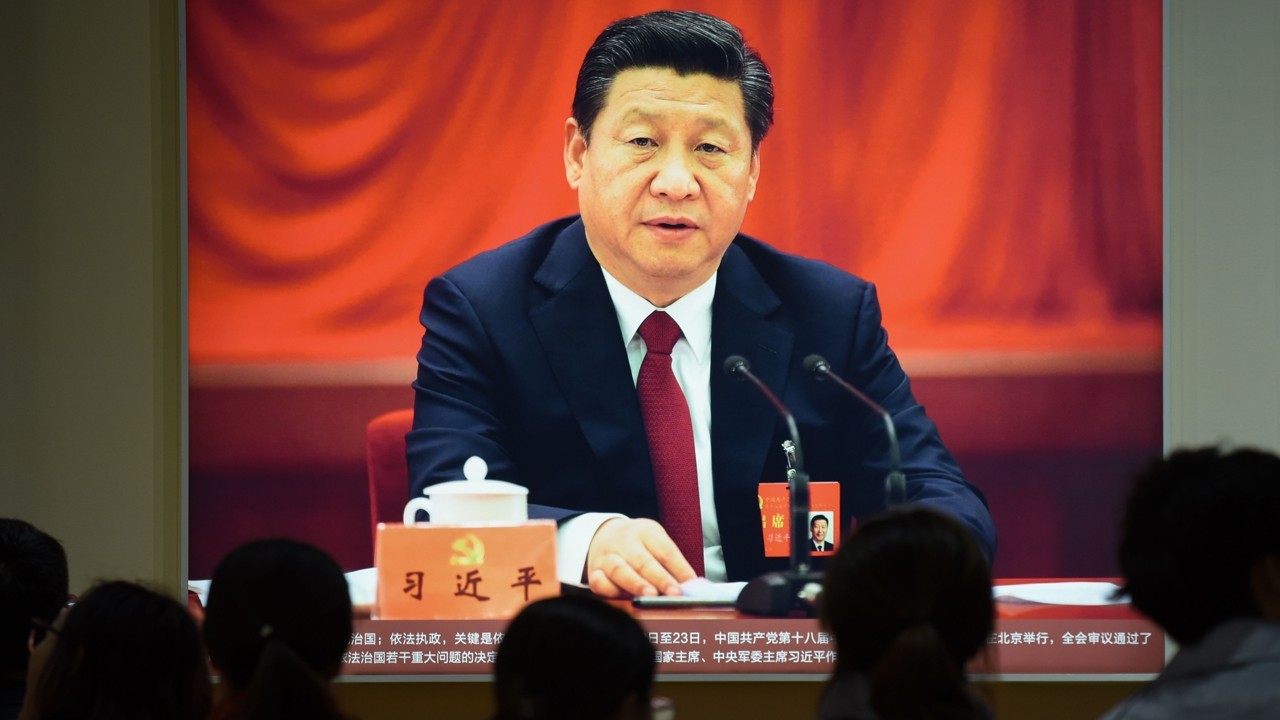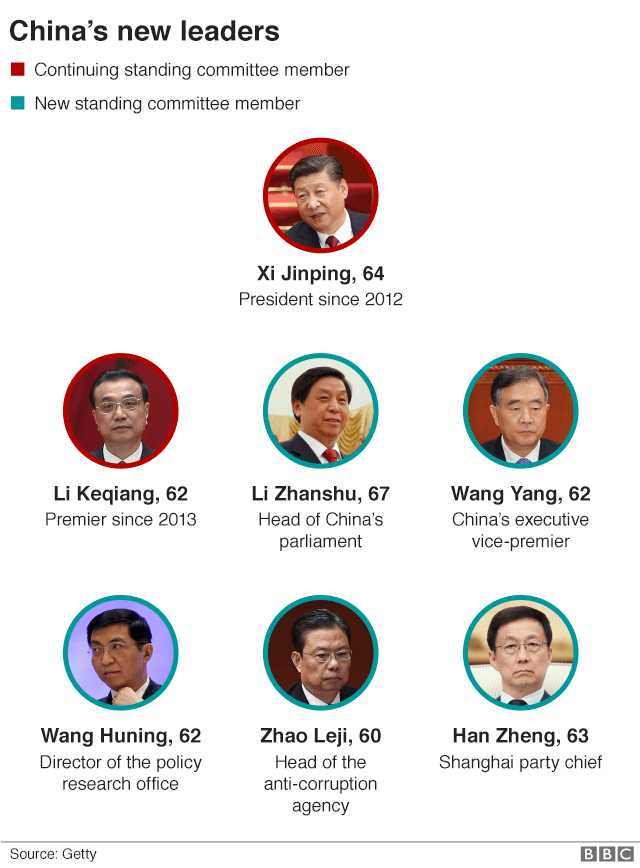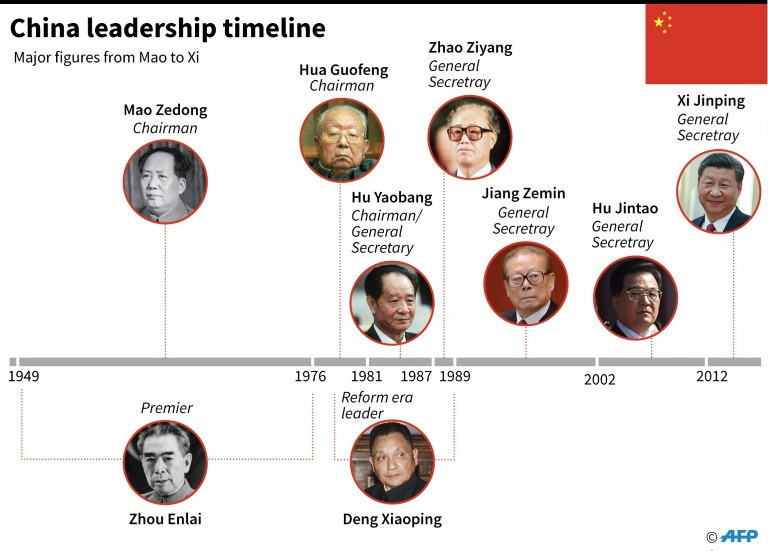
(TibetanReview.net, Oct26, 2017) – Five years after taking charge and as he began his second five-year term, Xi Jinping has become China’s most powerful leader since the eras of Mao and Deng, with his stature being raised above those of his two immediate predecessors Jiang Zemin and Hu Jintao during the just concluded 19th national congress of the Communist Party of China in Beijing. His rule has been characterised by human rights violations on a scale unprecedented during China’s era of opening up and economic liberalization save in the immediate aftermath of the 1989 Tiananmen Square massacre.
An amendment to the Constitution of the Communist Party of China (CPC) was approved Oct 24, making ‘Xi Jinping Thought on Socialism with Chinese Characteristics for a New Era’ a new component of the Party’s guide for action, reported China’s official Xinhua news agency, citing a resolution adopted at the closing session of the five-yearly national party congress.
Although both Jiang and Hu also had their thoughts – namely the Three Represents and the Scientific Concept of Development – inscribed in the party constitution, it is only Mao Zedong, Deng Xiaoping and Xi Jinping whose names find mention in it. But Deng’s name was added only posthumously.
Besides, Jiang had no choice but to live with the successor designated by Deng Xiaoping who installed him after removing Zhao Ziyang for his sympathy with the pro-democracy student protesters which led to the Tiananmen Square Massacre of Jun 1989. That successor, Hu Jintao, could not anoint his protégé Li Kejiang, the current Premier, to succeed him. Rather, he had to accept the compromise candidate Xi Jinping to succeed him.
The amendment solidified Mr Xi’s position as China’s most powerful leader in decades after only five years of leading the country, making it harder for rivals to challenge him and his policies, noted nytimes.com Oct 24. It added that while there may be no “Little Red Book” of quotations for mass consumption like in the bygone Mao era, Mr Xi’s thinking will now infuse every aspect of party ideology in schools, the media and government agencies.
And so, Xi has packed the party Central Committee and the Politburo, including the all-powerful Politburo Standing Committee, with his allies and faithfuls after having ensured that most of his opponents were either jailed on corruption charges or disempowered. Their protégés have also been shown the door. Liberals have either been jailed or purged. Xi has also recast the top military leadership, packing key roles with allies, noted a firstpost.com commentary Oct 25.
The 2,336 delegates who attended the congress after endorsing a second five-year term for the 64-year-old party general secretary Xi Jinping also ‘elected’ a new 204-member Central Committee which meets once a year to approve broad policy priorities.
And the first plenary session of the 19th CPC Central Committee on Oct 25 ‘elected’ its 25-member Political Bureau (or Politburo) and from amongst them the seven-member Standing Committee of the Politburo, the country’s top ruling body which includes Mr Xi.
China’s official Xinhua news agency Oct 25 listed, in the order of the number of strokes in their surnames, the names of the Political Bureau members as: Ding Xuexiang, Xi Jinping, Wang Chen, Wang Huning, Liu He, Xu Qiliang, Sun Chunlan (female), Li Xi, Li Qiang, Li Keqiang, Li Hongzhong, Yang Jiechi, Yang Xiaodu, Wang Yang, Zhang Youxia, Chen Xi, Chen Quanguo, Chen Min’er, Zhao Leji, Hu Chunhua, Li Zhanshu, Guo Shengkun, Huang Kunming, Han Zheng and Cai Qi. 
And the members of the Politburo Standing Committee, in order of their seniority, are President Xi Jinping, Premier Li Keqiang (62), Li Zhanshu (67), Wang Yang (62), Wang Huning (62), Zhao Leji (60) and Han Zheng (63). All will be too old to succeed Xi when his current term ends in 2022.
Four of the seven members of the standing committee are known for their absolute loyalty to Xi while, according to the scmp.com Oct 25, 10 (namely, Ding Xuexiang, Liu He, Li Xi, Li Qiang, Li Hongzhong, Zhang Youxia, Chen Xi, Chen Miner, Hung Kunming and Cai Qi) of the 15 new faces on the full Politburo are regarded as his allies, protégés or loyalists.
Conspicuously missing from the Standing Committee is any person who could be viewed as a designated successor to the current party General Secretary, fueling widespread suspicion that Xi plans to defy precedent set by Deng when he made Jain Zemin the party secretary to rule China beyond his two five-year terms. All the new members of the new Standing Committee are in their 60s and are therefore expected to retire by 2022 when Xi’s second term would end.
Neither Guangdong party chief Hu Chunhua (54), a Hu Jintao protégé widely tipped to be Xi’s successor, nor the president’s own protégé, Chongqing party chief Chen Miner (57), have secured a seat on the Politburo Standing Committee.
This is likely to fuel the debate over whether Xi intends to extend his reign beyond a second term, according to the scmp.com report. It added that this might also suggest that Xi is reconsidering the designated successor system introduced by paramount leader Deng Xiaoping, which has guided power transitions for the past three decades.
Deng introduced the system of designated successor to bring a semblance of order into an opaque and fractious power-transition process in China. So, by discarding the unspoken conventions that have ensured relatively stable leadership changes, Mr Xi has pushed Chinese politics into new territory that critics have warned could lead to turmoil, or a return to Mao-style despotism, noted the nytimes.com report.
He thereby “shows himself to be more like Mao than we originally thought — he demonstrates his power by overturning institutions,” Professor Shirk, a former State Department deputy assistant secretary for China policy, was quoted as saying.
The scmp.com report said former personnel chief and Xi ally Zhao Leji will take over the party’s top anti-graft watchdog from retiring chief Wang Qishan. Speculations that Wang, Xi’s most trusted ally, may be retained despite being past the unofficial retirement age, did not bear out.
The report also said Li Zhanshu, Xi’s most trusted ally and the country’s new number three, is expected to head the National People’s Congress – China’s parliament.
And the liberal-leaning Vice-Premier Wang Yang, 62, who ranks fourth on the Standing Committee, is likely, if traditions are followed, to chair the top political advisory body, the Chinese People’s Political Consultative Conference.
Li Keqiang was previously expected to lose his post as Premier to a person preferred by Xi. However the Number Two in the Politburo Standing Committee is now expected to retain his government post, although with his powers limited to following Xi’s orders.
The leadership of the powerful Central Military Commission, the body that oversees the military, was also unveiled on Oct 25. General Zhang Youxia, a former director of the commission’s equipment development department and a trusted ally of Xi, was named as the new second vice-chairman, noted the scmp.com Oct 25. 


